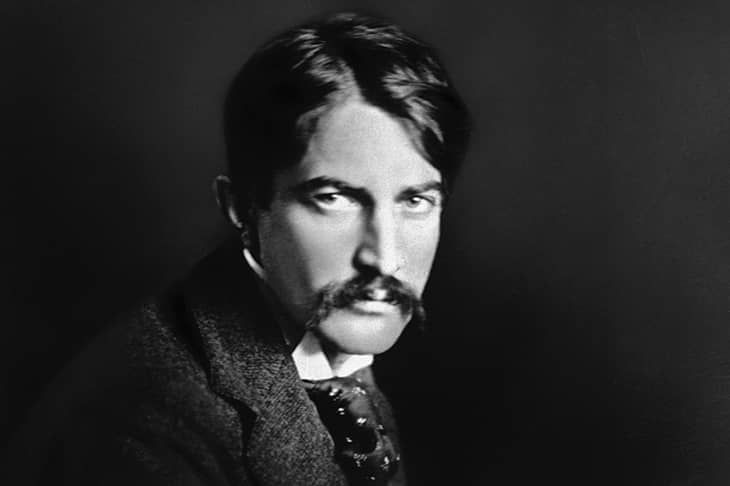Long before Ernest Hemingway wasted his late career playing the he-man on battlefields and in fishing boats, or Norman Mailer wasted an entire career playing Hemingway, Stephen Crane was the most world-striding combative male intelligence in literature. And while he created the template for every ‘manly’ novelist who came after, from Jack London to Robert Ruark, he never sought attention as a man but only as a writer; and he certainly never issued many advertisements for himself.
Instead, he almost surreptitiously explored the world’s most violent places with inexhaustible intrepidity. Living both privately and intensely, he wrote some of the most powerful prose of his generation, and died too young — though by all accounts he placed himself in so many dangerous situations, especially as a war correspondent in Cuba and Greece for the Hearst newspapers, that he might easily have died even younger.
This is more than an unusual, well-written account of more than Crane’s life: it is an account of one man’s close reading of another over 50 years of continual interest and affection. And while Paul Auster relies on many useful academic books and authorities, he admirably avoids using critical terminology. There is minimal ‘historicising’ of Crane, even though the chronology of the family is well recounted; and there is hardly a hint of ‘psychologising’ a very complex man. Rather, Auster simply wants to get to know Crane the man and writer better; and along the way, help readers to get to know him better, too.
He was born in Auster’s home town of Newark in 1871; and from a young age, death seemed to be everywhere. His parents were schoolteachers who, like several of their children, died young; and Crane was never in good health himself. He caught the writing bug early; and long before Orwell was taking ‘urban rides’ in the poorest parts of England, or Jack London was exploring hobo camps and train cars to devise his gritty socialism-inspired novels, Crane was exploring the mean streets of New Jersey and Manhattan, especially The Bowery, where he completed his first short, explosive novel, Maggie: A Girl of the Streets, at the age of 19.
Maggie was (and remains) a hard book to read — a dark, naturalistic journey into the futile life of a poor young girl who is filled with too much hope and no possibilities. Unavoidable tragedy finds her early, whether through the animalistic battles of her parents or her surrender to a young man who makes promises he never keeps. Like most of Crane’s later fictions, Maggie is written with passionate intensity. He clearly knew the streets and vernacular of his characters; and he steadily maintained a weird, objective distance from their aspirations and failures, forcing readers to live in the homes of people they probably never wanted to know at all.
A large part of him seemed unafraid of death, perhaps because, in some ways, he was dead already
It was hard to find a publisher for Maggie, so Crane published it himself. Distributing it privately to local writers and editors, such as Hamlin Garland and William Dean Howells, he began developing a network of associates who would help him find work in journalism and sell his subsequent fiction.
There is hardly a scene of Crane’s most famous work (and the only one that sold well in his lifetime), the Civil War novel The Red Badge of Courage, that doesn’t pulse with his vision of human existence as a naturalistic storm of violence that is always about to overwhelm everyone in it. Even the novel’s title indicates a world of half-aware people marching into death or fleeing from it, while wearing the only sign of ‘courage’ an awful war allows — that of the open wound. (In one of Crane’s greatest, most disturbing novellas, The Monster, the protagonist is a black man who saves a white child from a fire, and survives to display his hideously scarred face and body to the city that disdained him.) There are brief sparks of love and hope and aspiration and human community in Crane’s world, but more often there is just an oceanic wave of pain and fear that engulfs everyone indiscriminately.
Crane was not always successful as a lover to the women he lived with, or as a dutiful writer to the editors who hired him; nor did he have any children. His primary devotion, it seems, was to his work. As he later wrote, his first novel was more to him than an assembly of words and paragraphs:
My first great disappointment was in the reception of Maggie: A Girl of the Streets. I remember how I looked forward to its publication, and pictured the sensation I thought it would make. It fell flat. Nobody seemed to notice it or care for it… Poor Maggie! She was one of my first loves!
Any writer who has worked hard producing work they care about will sympathise with his pain.
Despite a lifetime of financial worries, nothing stopped Crane from writing; and as Auster makes clear in his exhaustive close readings of Crane’s various works of fiction, reportage and poetry, he was always either very good or very great. In one of his best explanations of Crane’s unusual abilities, he writes:
What intrigues me most about Crane is his many-ness. Not just the several selves he carried around with him in his small body (every one of us is a spectrum of multiple, contradictory selves) but his talent for being able to think one thought while also thinking another thought and perhaps a third and even a fourth without losing track of the first; or, to put it another way, the ability to inhabit different states of mind in rapid, vertiginous succession.
This ‘many-ness’ of Crane allowed him to inhabit poems as well as prose, short stories as well as novels, comic fiction (such as ‘The Bride Comes to Yellow Sky’) and naturalistic melodramas such as the short novel George’s Mother, which envisages a group of Fight Club-like losers who spend their nights drinking and battling one another in a bar.
What clearly burned in Crane was a desire to refashion the ugliness of existence into beautiful art, and that is the most unforgettable quality of a Crane story, novel or poem; each one is almost unbearable to experience and impossible to forget. He wrote with unconcealed rage at the indifference of nature to the awful things it did to men and women — whether they were being herded from one battlefield of fear to another, or left shipwrecked in one of his greatest stories, ‘The Open Boat,’ based on his experience as a shipwreck survivor. As he observes in that story:
When it occurs to a man that nature does not regard him as important, and that she feels she would not maim the universe by disposing of him, he at first wishes to throw bricks at the temple, and he hates deeply the fact that there are no bricks and no temples.
Like many of Crane’s characters, the ‘correspondent’ has trouble accepting that nature bears no love for him, even while he can’t stop thinking: ‘Yes, but I love myself.’
His characters often swing between these extremes: from wishing the natural world might let them live a little longer to abandoning all hope. As one friend recalled who observed him in Cuba: ‘Crane was the coolest man, whether army officer or civilian, that I saw under fire at any time during the war. He was most annoyingly cool, with the assurance of a fatalist.’ There was a large part of him that seemed unafraid of death, perhaps because, in some ways, he was already dead.
After years of furious writing and living, he spent his last months dying of tuberculosis in Ofted, England, often visited by adoring friends such as H.G. Wells, Ford Madox Ford and Joseph Conrad, and cared for by his common-law wife, Cora, a former bordello operator who gave up everything to follow and support him and his talent. When he eventually died in a German sanatorium at the age of 28, Henry James (not known for distraught hyperbole) wrote: ‘What a brutal, needless extinction — what an unmitigated, unredeemed catastrophe! I think of him with such a sense of possibilities and powers!’ It was as if the painful human catastrophes that Crane wrote about embodied his memory after he was dead.
According to Auster, Crane is strangely disregarded today in our pretty catastrophic itself 21st century. It’s a situation that might partly be rectified by this admiring, devoted, very big and very enjoyable book.






Comments